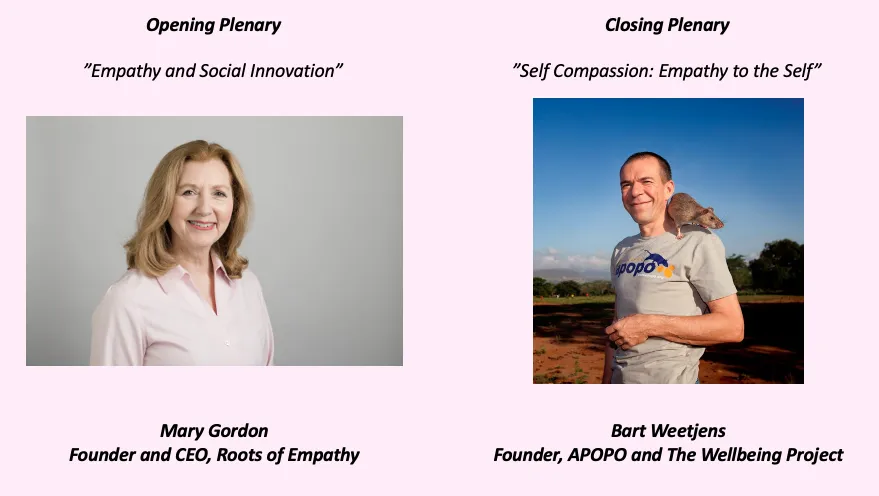Keynote Guest Speakers
International Ashoka Fellows

Recognized internationally as an award-winning social entrepreneur in the field of education, Mary Gordon has coached worldwide on the importance of soft skills, most notably: empathy.
Piloted in Toronto in 1996, these classes laid the foundation for an evidence based global program, Roots of Empathy. A global award-winning program with a mission to build caring, peaceful and civil societies by raising levels of empathy in children has been proven to reduce violence, aggression, and bullying and increase prosocial behavior on three continents.
Roots of Empathy is a classroom-based program which brings an infant and his/her parents into a class, along with an Instructor trained in a focused curriculum. The Instructor guides the children to give labels to the baby’s feelings and discuss what they think the baby is thinking and feeling. The idea is that through this experiential learning, children come to understand their own emotions and to understand how their classmates feel.
The cognitive aspect of empathy is perspective taking and research from multiple randomized controlled trials have proven that not only do children who have Roots of Empathy improve in cognitive empathy but they also improve in affective empathy, emotional literacy. This “emotional literacy” taught in the program helps children become more competent in understanding their own feelings and the feelings of others (empathy) and are therefore less likely to physically, psychologically, and emotionally hurt each other through bullying and other unkind acts.
The curriculum is comprehensive and attuned to the developmental stages and interests of the children. The curriculum is divided into nine themes, with three classroom visits supporting each theme (a pre-family visit, a family visit (a baby and her/his parent visit) and a post-family visit) for a total of 27 classes. Each of the nine themes is further broken down into four age ranges in elementary/primary schools.
Roots of Empathy Instructors participate in a four day training and receive ongoing mentoring and professional development. They are community volunteers who have an openness to understand and embrace the mission, goals, philosophy, and values of Roots of Empathy and an enthusiasm and ability to work in an interactive way with children in the program.The instructors’ background is often retired teachers, early childhood educators, school and public health nurses, police and firefighters and others.
The program is now in every province in Canada, New Zealand, the United States, the Republic of Ireland, England, Wales, Northern Ireland, Scotland, Norway, Germany, Switzerland, Netherlands, Costa Rica, and South Korea and more than one million children have attended the classes.
Bart Weetjens
Founder, APOPO
Ashoka Fellow (selected 2006)
Bart Weetjens, a Belgian Zen priest and celebrated social entrepreneur whose innovative research with scent detection is healing the explosive lands of a third of the world’s countries.
There are around 55 million landmines and unexploded ordnances in over 84 countries throughout Asia, Africa, Europe, the Middle East,South America and Central America. Every year, 40,000 new landmines are planted in conflict zones, and every day, 40 to 50 people are killed or maimed by one of them. 21 African countries are affected by landmines, which kill, injure, or disable over 12,000 people each year. However, there was no efficacious solution to this imminent issue. The most feasible method of de-mining then was to combine manual de-mining and the usage of mine- detection dogs. Dogs can sniff explosives and scan a wide area, but a trained dog from the US or European countries is as expensive as USD $20,000 per dog. They are also prone to tropical diseases and carry enough weight to potentially set off a landmine requiring lots of training skills in the handlers.
Bart recollects, ‘I got a hamster on my ninth birthday as a present. I fell in love with him and by the time I was a teenager I was breeding rodents and selling them to pet shops. Around that time, Belgian media was frequently reporting on the problems of the landmines in Africa. For example, Princess Diana’s visit to landmine victims in Bosnia was hugely publicized in 1997. Then something connected in my mind! Can we connect rodents’ olfactory sense with this imminent crisis?’
Upon graduating from Antwerp University, Bart started to experiment by training rats to detect landmines in a small laboratory in Antwerp. He recalls, ‘I received lots of criticism because I was only 29 years old who had no experience in the field but I soon decided to set up a training field in Morogoro, 190 kilometers west of Dar es-Salaam, Tanzania’s main urban center. I thought the on-site training would be more convincing to sway their doubts.’ Bart’s idea—over several years—was proven to be the most effective and the least costly de-mining technology in the world, and it led him to set up APOPO, a non-profit organization that trains African giant pouched rats to save lives by detecting landmines. A trained rat can scan 100 meters in 30 minutes, twice the area covered by an expert de-miner in one day besides costs being much lower than training a dog. Since its inception, APOPO has denied 86 million square meters of land to free 5,800,000 people from landmines. In 2015, they completed de-mining in Mozambique and the country was officially declared mine-free. They are now in Angora aided by JICA, and beyond the African continent in South-East Asia.
When Mozambique officially announced itself free from landmines in 2015, Bart transitioned from his executive role to focus on the practice of Zen. In the same year he got involved in The Wellbeing Project, which aims to catalyze a culture of inner wellbeing for all changemakers. While exploring the relationship between personal growth and social action, he recently undertook a new initiative to develop a holistic permaculture/wellbeing center in the French Ardennes: La Grande Terre, where he facilitates many of his Zen workshops and individual coaching trajectories.



